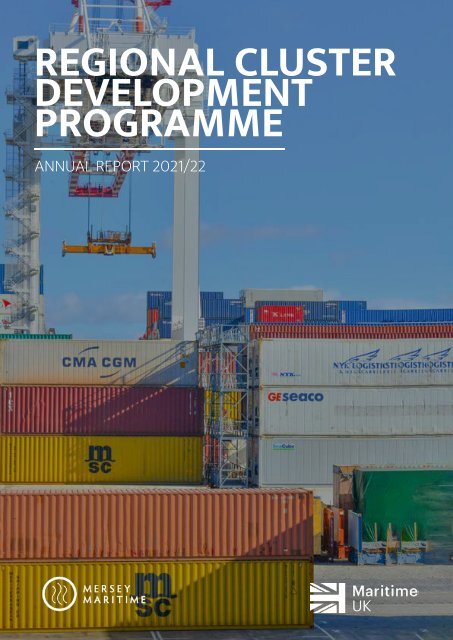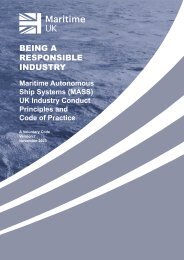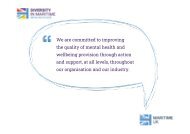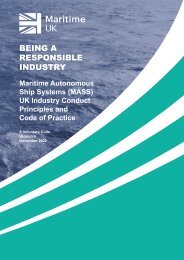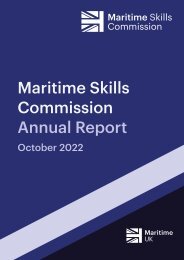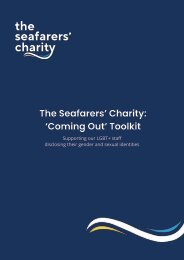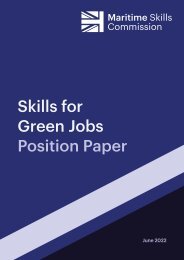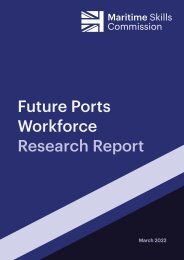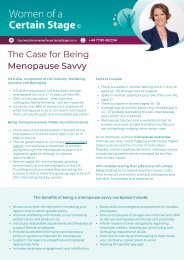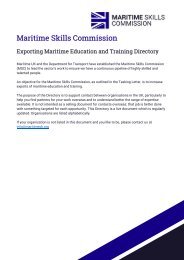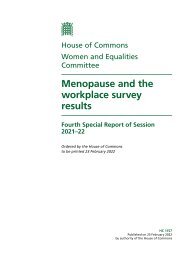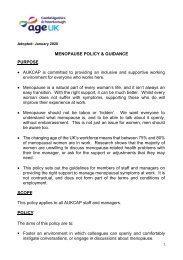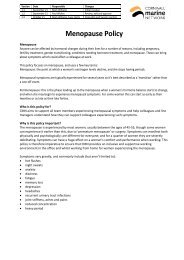You also want an ePaper? Increase the reach of your titles
YUMPU automatically turns print PDFs into web optimized ePapers that Google loves.
REGIONAL CLUSTER<br />
DEVELOPMENT<br />
PROGRAMME<br />
ANNUAL REPORT <strong>2021</strong>/<strong>22</strong>
INTRODUCTION<br />
This is the first iteration of an ‘<strong>Annual</strong> <strong>Report</strong>’ into the work of the Maritime UK and Mersey<br />
Maritime jointly delivered ‘<strong>Regional</strong> Growth / <strong>Regional</strong> <strong>Cluster</strong> <strong>Development</strong> <strong>Programme</strong>’<br />
activity. This work forms part of one of the five key areas of focus for Maritime UK and is<br />
embedded in the priorities and themes identified in the Maritime 2050 <strong>Report</strong> (2019).<br />
As the UK’s longest established and most developed ‘<strong>Regional</strong> <strong>Cluster</strong> Organisation’ (RCO),<br />
Mersey Maritime, which represents the maritime industry in the Liverpool City Region<br />
and greater North West, is the lead delivery partner in a programme that is substantially<br />
supported by the Department for Transport in financial terms. Additional resource is also<br />
accessed from other programmes around specific activities and industry/government<br />
priorities as needed. The programme is delivered by Chris Shirling-Rooke (CEO, Mersey<br />
Maritime) and Simon Eardley (<strong>Regional</strong> <strong>Cluster</strong> <strong>Development</strong> Manager), with input from<br />
the whole Maritime UK and Mersey Maritime team around key engagement and in terms<br />
of utilising specific expertise.<br />
This report will set out the following key elements, including:<br />
• Background and context to the programme<br />
• Activity and deliverables over the period of the report<br />
• The work of the Maritime UK <strong>Regional</strong> Council<br />
• A summary of each existing cluster with a basic assessment of their status, key focus<br />
within the industry and key work programmes<br />
• Analysis of the economic impact of the maritime industry at a regional level<br />
• A forward look to the wider and future work of the programme<br />
• Key contact details and geographic coverage for each RCO.<br />
The period of this report covers January <strong>2021</strong> to July 20<strong>22</strong>. It is intended to publish it on an<br />
annual basis, soon after July each year, covering a whole 12-month period in the future.
BACKGROUND<br />
Maritime UK and Mersey Maritime, together with its partners, is responsible for the development<br />
and roll-out of an ambitious ‘<strong>Regional</strong> <strong>Cluster</strong> <strong>Development</strong> <strong>Programme</strong>’, an initiative embedded in<br />
the priorities set out in ‘Maritime 2050: Navigating the Future.’ Maritime 2050 is the first long-term<br />
strategy for the UK’s maritime sector and was launched by government in 2019. This vision recognises<br />
the maritime sector as being of significant importance to Britain’s future success, with regions and their<br />
individual unique specialist areas of focus, critical to driving the industry forward in the 21st century.<br />
THE MARITIME 2050 VISION<br />
“The UK will retain a diversity of maritime clusters that excel in their respective specialisations. London<br />
will remain the leading professional services centre in the world, the leading maritime centre in Europe,<br />
and one of the top maritime centres globally.<br />
The UK will retain a highly attractive destination for maritime industry leaders and staff to work and live.<br />
UK-based maritime schools, colleges and universities will continue providing top-quality programmes<br />
and qualifications, providing technologically advanced skills that will be required in the maritime era.<br />
The UK will maximise the benefit of its leading clusters across the country, retaining London as the home<br />
for maritime business and the global home of the IMO. The UK maritime sector will be consistently<br />
recognised for the ease with which business is done and the way in which government and industry<br />
work as one to promote the offer.”<br />
In short, the vision is for:<br />
• Government and industry to work together to maintain and enhance the attractiveness of the UK’s<br />
regional maritime clusters<br />
• Government to support, enhance and promote the strength of all regional clusters in the UK, and<br />
their importance to the economy<br />
• Where appropriate, the strengthening of ties between government, industry and academia to build<br />
on existing cluster success and identify new opportunities.<br />
A GOVERNMENT BACKED PROGRAMME<br />
The concept of a <strong>Regional</strong> <strong>Cluster</strong> <strong>Development</strong> <strong>Programme</strong> was developed as a direct response to<br />
Maritime 2050 and the emphasis it places on the importance of regions and regional growth to the<br />
future prosperity of the maritime industry at a national level. Mersey Maritime and Maritime UK worked<br />
in partnership to place a proposal before the Department for Transport to bring about the practical<br />
delivery of ‘on the ground’ programme activity. This was formulated in 2019 and led to the recruitment<br />
of professional support to deliver engagement and provide secretariat support to the work of the<br />
Maritime UK <strong>Regional</strong> Council. This was in embryonic form at that time as a body to bring together<br />
representatives of existing and emerging centres of RCO activity around the coast (see summary of its<br />
work later in this document).<br />
Initially the programme was funded for one year between the Department for Transport and Mersey<br />
Maritime. Progress in delivery saw a three-year, match-funded proposition, agreed and implemented<br />
from <strong>2021</strong>. The initial and core emphasis of the work seeks to build on existing cluster success and<br />
identify new opportunities and strengthen the ties between government, industry and academia at both<br />
a regional and national level. As noted already, Mersey Maritime is the national lead for this project and<br />
is recognised as the preferred best practice model for its rollout in other places.<br />
WHAT IS A ‘REGIONAL CLUSTER<br />
ORGANISATION’?<br />
• A hybrid of trade body, chamber of<br />
commerce and lobbying ‘organisations’<br />
• Loosely based on established cluster<br />
models on the continent and further<br />
afield<br />
• RCOs support and intervene in single<br />
industry / associated sub-sectors<br />
• Focus on creating jobs and growth<br />
• Championing a particular region leads to<br />
direct correlation between RCO, increased<br />
productivity and innovation – growth and<br />
job generation across all sizes of business<br />
within the industry.<br />
WHAT DO REGIONAL CLUSTER<br />
ORGANISATIONS DO?<br />
Maritime 2050 sets out that their primary<br />
role is to create regional growth and in turn<br />
support national aims and objectives. To<br />
achieve this they focus on:<br />
• Increasing the profile of the region as a<br />
champion for the maritime industry<br />
• Providing the region with a critical<br />
pathway of communication and<br />
intelligence to government and key<br />
industry stakeholders<br />
• Fostering intra-regional collaboration,<br />
creating the framework for collaboration<br />
and aligning activity across a given<br />
geographic area<br />
• Driving export and foreign direct<br />
investment activity and opportunities<br />
• Acting as a conduit between industry,<br />
education and government<br />
• Facilitating networking and mentoring<br />
programmes to help create an ecosystem<br />
that is vital for growth<br />
• Encouraging knowledge and best practice<br />
sharing at a regional level and in turn<br />
nationally, even internationally<br />
• Delivering wider national programmes<br />
and initiatives at a regional level such as<br />
the MUK Careers Campaign and Diversity<br />
in Maritime.
CURRENT NETWORK<br />
OF REGIONAL CLUSTER<br />
ORGANISATIONS<br />
FUNCTIONAL RCOs AT DIFFERENT<br />
STAGES OF DEVELOPMENT<br />
• Belfast Maritime Consortium<br />
• Humber Marine & Renewables<br />
• Maritime UK Solent<br />
• Maritime UK South West<br />
• Mersey Maritime<br />
• Scottish Maritime <strong>Cluster</strong><br />
NORTHERN<br />
IRELAND<br />
SCOTLAND<br />
NORTH EAST<br />
MERSEY<br />
HUMBER<br />
ACTIVELY WORKING TO CREATE RCOs IN:<br />
• East Anglia<br />
• North East of England<br />
• South East of England<br />
• Wales<br />
WALES<br />
EAST<br />
ANGLIA<br />
SOUTH WEST<br />
SOLENT<br />
SOUTH EAST
OBJECTIVE ASSESSMENT OF RCO STATUS AND INDICATION OF FOCUS / WORK PROGRAMMES<br />
REGION / RCO<br />
RAG STATUS<br />
(see note below)<br />
MUK STATUS KEY FOCUS WITHIN THE INDUSTRY KEY WORK PROGRAMMES<br />
Belfast Maritime Consortium Full regional member • Innovation in green technology<br />
• Shipbuilding<br />
• Offshore wind<br />
• Strength in Places project led by Artemis Technologies (zero emission ferries)<br />
• Clean Maritime Demonstration Competition funded projects (rounds 1 and 2)<br />
Maritime UK Solent Full regional member • MUK Solent has identified the following priorities:<br />
• People<br />
• Innovation<br />
• Environment<br />
The Solent maritime cluster - uniquely - benefits<br />
from excellence across the spectrum of maritime,<br />
including:<br />
• Ports and Shipping<br />
• Maritime Defence<br />
• Autonomy<br />
• Robotics<br />
• Training<br />
• Academia and Research<br />
• Leisure Marine<br />
• Heritage and Tourism<br />
• Regulatory<br />
• Classification<br />
Specific world-leading maritime strengths in the<br />
Solent with significant market potential are:<br />
• Autonomous Maritime<br />
• Connected Maritime<br />
• Clean Maritime<br />
Maritime UK South West (inc.<br />
Cornwall Marine Network)<br />
Full regional member • Offshore renewable (inc. floating offshore wind)<br />
• Autonomy, maritime cyber and digital ocean<br />
technology<br />
• Skills/training/ apprenticeships<br />
• Environmental / digital technology<br />
• Advanced engineering<br />
• Marine<br />
• Defence<br />
• Concentration of harbours and ports (Falmouth,<br />
Plymouth, Poole, Portland)<br />
• Clean maritime<br />
Mersey Maritime Full regional member • Port operations (UK’s most significant west facing<br />
port)<br />
• Shipbuilding including (Cammell Laird and<br />
specialist SMEs)<br />
• Maritime professional services<br />
• Engineering<br />
• Offshore wind<br />
• Established a strong board of senior industry leaders<br />
• Incorporated MUK Solent Limited<br />
• Published first business plan.<br />
• Secured capacity funding for three years<br />
• Developing a revenue generation plan to be self-sustaining<br />
• Appointed new resource and entered into SLA with accountable body<br />
• Commissioned work to identify the key global maritime innovation strengths of the<br />
Solent with greatest market potential<br />
• Commissioned economic analysis of the impact of the Solent maritime sector - £7.7bn<br />
GVA and 200k jobs<br />
• Establishing a MUK Solent website<br />
• Maritime careers activity, inc. awareness raising / careers fairs<br />
• Developing a Solent Maritime Innovation Hub<br />
• Hosting the inaugural MUK Solent Awards to champion the sector<br />
• A partner of the new South Coast Institute of Technology<br />
• Delivering the maritime skills components of the Solent Local Skills Improvement Plan<br />
• Facilitating engagement in CMDC activity to lead decarbonisation within the cluster<br />
• Corporate development of new cluster in operation<br />
• Hosted monthly networking meetings<br />
• Signed a collaboration agreement with Turku Business Region in Finland<br />
• Green skills / careers and skills needs, particularly amongst SMEs<br />
• Plymouth & South Devon Freeport<br />
• Global centre for marine research and innovation<br />
• Business development and support activities<br />
• Ocean Futures <strong>Programme</strong><br />
• Maritime Knowledge Hub project<br />
• LCR Freeport<br />
• Innovation project support and delivery (CMDC and other)<br />
• Collaborative ecosystem activity (networking events and industry specific forums)<br />
• Thought leadership (annual profile conference; Mersey Maritime Exchange)<br />
• Mersey Maritime Industry Awards<br />
• Port City Innovation Hub
REGION / RCO<br />
RAG STATUS<br />
(see note below)<br />
MUK STATUS KEY FOCUS WITHIN THE INDUSTRY KEY WORK PROGRAMMES<br />
Scottish Maritime <strong>Cluster</strong> <strong>Regional</strong> Council member only Ship management;<br />
• Naval ship design, build and support;<br />
• Offshore energy operations;<br />
• Nautical training and personnel capability;<br />
• Maritime education (universities and academics);<br />
• Professional support services.<br />
Humber Marine and Renewables<br />
(formerly Team Humber Marine Alliance)<br />
<strong>Regional</strong> Council member only • Offshore wind<br />
• Offshore oil and gas<br />
• Ports and commercial shipping<br />
• Marine engineering<br />
• Skills<br />
• <strong>Cluster</strong> members have identified five key<br />
strategic areas as their focus – commercial<br />
shipping, naval/military contracts, maritime<br />
business support services, maritime<br />
legislation and education and training<br />
• Leadership base for Maritime Research &<br />
Innovation UK<br />
• National Shipbuilding Strategy<br />
• Future skills development in marine and<br />
renewables: identify skills gaps, future skills<br />
requirements and where possible build local<br />
capacity. Focus on providing pathways for careers<br />
in marine/offshore industries including wind crew,<br />
deckhands, skippers, pilots, O&M technicians,<br />
stevedores etc.<br />
• <strong>Development</strong> of the wider Humber industrial area<br />
from a maritime perspective (as a key component):<br />
• Infrastructure: deliver the infrastructure<br />
required to maximise the impact of the<br />
Humber ports and increase their contribution<br />
to the Humber and UK economies<br />
• Innovation: capitalise on new technologies to<br />
ensure Humber ports remain at the leading<br />
edge of innovation within the sector<br />
• People: prepare the workforce for the ports<br />
and logistics sector of the future, ensuring<br />
alignment with other skills activity across the<br />
Humber<br />
• Business environment: create business<br />
environment which supports intensification<br />
and diversification of activity around the<br />
ports<br />
• Place: develop the ‘Humber Maritime<br />
Supercluster’ collaborative partnership<br />
amongst the key businesses and stakeholders<br />
within the Humber<br />
East Anglia <strong>Regional</strong> Council invitee TBC and agreed as development work is taken<br />
forward here<br />
South East <strong>Regional</strong> Council invitee TBC and agreed as development work is taken<br />
forward here<br />
• Felixstowe and Harwich Freeport<br />
• Thames Freeport<br />
• Felixstowe and Harwich Freeport<br />
• Dover Straits Channel operations
REGION / RCO<br />
RAG STATUS<br />
(see note below)<br />
MUK STATUS KEY FOCUS WITHIN THE INDUSTRY KEY WORK PROGRAMMES<br />
North East – Tyne <strong>Regional</strong> Council invitee TBC and agreed as development work is taken<br />
forward here<br />
• Maritime 2050 Innovation Hub<br />
North East – Tees Valley <strong>Regional</strong> Council invitee TBC and agreed as development work is taken<br />
forward here<br />
• Teeside Freeport<br />
• Skills / training / apprenticeships (NE School of<br />
Shipping)<br />
‘RAG’ STATUS EXPLANATORY NOTE:<br />
‘RAG’ STATUS<br />
DEFINITION OF<br />
‘RAG’ STATUS<br />
Established<br />
In development<br />
Early<br />
development<br />
BASIC EXPLANATION (EXAMPLES TO<br />
SHOW EVIDENCE)<br />
Established; Governance fully in place;<br />
Business Plan formulated; Activity<br />
undertaken, MUK regional member<br />
Established but might be in transition;<br />
Governance in place or being developed;<br />
Activity plan in place or being developed;<br />
<strong>Regional</strong> Council participant only<br />
Embryonic establishment; Governance<br />
not determined; Limited activity<br />
underway or ad hoc; <strong>Regional</strong> Council<br />
participant only (but present)
MARITIME UK REGIONAL<br />
COUNCIL<br />
The Maritime UK <strong>Regional</strong> Council exists to bring together maritime RCOs from across the UK. In<br />
doing so, these RCOs seek to share best practice, collaborate and support the creation of new cluster<br />
organisations. Maritime UK started its journey by bringing together national trade associations to<br />
collaborate within the National Council. The <strong>Regional</strong> Council is, in effect, a replication of this work but<br />
with a unique regional focus to support the collective aim of driving growth in the UK maritime sector<br />
and strengthening international competitiveness.<br />
Full Maritime UK members within regions sit on the <strong>Regional</strong> Council as well as the National Council.<br />
An inclusive approach is adopted to the wider group of stakeholders who are engaged with <strong>Regional</strong><br />
Council meetings, with the group open to representatives of organisations with whom the <strong>Regional</strong><br />
<strong>Cluster</strong> <strong>Development</strong> Team are working to help drive the development of new RCOs. The <strong>Regional</strong><br />
Council can make recommendations to the National Council but it is not a decision-making body as such.<br />
It is chaired by Paul Wickes (Cornwall Marine Network/Maritime UK South West) who is supported by<br />
David Tyler (Belfast Maritime Consortium) as Deputy Chair.<br />
The <strong>Regional</strong> Council meets on a quarterly basis and since the start of <strong>2021</strong> has met as follows:<br />
• 17 March <strong>2021</strong> – online owing to Covid-19 restrictions<br />
• 01 July <strong>2021</strong> – hosted by Mersey Maritime / hybrid meeting<br />
• 14 September <strong>2021</strong> – hosted during London International Shipping week / hybrid meeting<br />
• 14 December <strong>2021</strong> – online owing to Covid-19 restrictions<br />
• 10 March 20<strong>22</strong> – hosted by the Scottish Maritime <strong>Cluster</strong> / hybrid meeting<br />
• 07 July 20<strong>22</strong> – hosted by BMT Global / hybrid meeting<br />
Engagement with a range of internal and external stakeholders is a key part of the work of the <strong>Regional</strong><br />
Council, in addition to the opportunity for Maritime UK programme updates and other activity reports.<br />
A standing update agenda item for the Department for Transport is included. A summary is provided<br />
here of those with whom the group have engaged over the course of the life of this annual report:<br />
MEETING<br />
KEY EXTERNAL ENGAGEMENT<br />
March <strong>2021</strong> • Workboat Association<br />
• LGA Coastal SIG<br />
July <strong>2021</strong> • Beyond 2050 (political stakeholder engagement best practice)<br />
• Woodrow Communications (maximising regional media coverage)<br />
September <strong>2021</strong> • Ocean Futures Project (MUK SW)<br />
• Maritime Skills Commission<br />
December <strong>2021</strong> • Department for Business, Energy & Industrial Strategy, Advanced<br />
Manufacturing & Services (Marine/Defence)<br />
• Department for International Trade<br />
• Mersey Maritime (commercial best practice workshop)<br />
March 20<strong>22</strong> • Maritime Skills Commission<br />
• BEIS – Home Shipping Credit Guarantee Scheme<br />
• Royal Navy – regional command<br />
July 20<strong>22</strong> • Connected Places Catapult<br />
• Casper Shipping / North East School of Shipping<br />
Action notes are issued following each meeting of the <strong>Regional</strong> Council and reported on at the<br />
quarterly meeting of the National Council.
REGIONAL ACTIVITY ROUNDUP REPORTS<br />
One of the most important activities of the <strong>Regional</strong> Council is to give the opportunity for inter-region<br />
best practice sharing and collaboration through experience and activity discussions. Since July <strong>2021</strong><br />
these reports have been published on the Maritime UK website, circulated to internal Maritime UK<br />
stakeholders and issued to colleagues in Government. The reports from July, September, December <strong>2021</strong><br />
and March and July 20<strong>22</strong> can be accessed on the Maritime UK website.<br />
ENGAGEMENT PROJECTS<br />
CLEAN MARITIME DEMONSTRATION COMPETITION (ROUND 1)<br />
Following the announcement of HM Government’s £23.2 million funding to support the decarbonisation<br />
of the maritime industry in the form of a ‘Clean Maritime Demonstration Competition’ (CMDC) in<br />
2020, regional cluster organisations were asked to facilitate and host dedicated briefing sessions for<br />
industry prior to the formal launch of the CMDC Round 1 in March <strong>2021</strong>. The funding was intended for<br />
UK innovators to support the design and development of zero emission vessel technologies and greener<br />
ports. Following an independent assessment, 55 projects won the competition and, supported by private<br />
consortia comprising 208 partners from around the UK, these projects were announced at London<br />
International Shipping Week <strong>2021</strong>.<br />
<strong>Regional</strong> cluster organisation led briefing sessions were held as follows:<br />
• 27 January <strong>2021</strong>: Mersey Maritime (North West); South East; Solent; South West<br />
• 28 January <strong>2021</strong>: North East (Port of Tyne hosted); Scotland; Northern Ireland; East Anglia.<br />
A number of projects involved businesses associated with regional cluster organisations, full details of<br />
which can be found HERE<br />
It is anticipated that regions will be asked to once again arrange similar events for future rounds of the<br />
CMDC, likely in the Autumn 20<strong>22</strong>, but with a greater emphasis on networking and consortia building in<br />
collaboration with the Department for Transport, Innovate UK and Innovate UK-KTN.<br />
LONDON INTERNATIONAL SHIPPING WEEK <strong>2021</strong><br />
Regions engaged with a range of activity across London International Shipping Week <strong>2021</strong>, including<br />
a dedicated ‘Coastal Powerhouse Day’ on Thursday 16 September <strong>2021</strong>. In collaboration with the LGA<br />
Coastal Special Interest Group, the British Ports Association, the UK Major Ports Group and our network<br />
of RCOs around the UK, the event saw the launch of a new Coastal Powerhouse Manifesto.<br />
The event included contributions from Amanda Solloway MP, then Minister for Research and Innovation<br />
(BEIS), Luke Hall MP, then Minister for <strong>Regional</strong> Growth & Local Government (former MHCLG) and Mike<br />
Kane MP, Shadow Maritime Minister, in addition to panel discussions with RCO representatives.<br />
• Read more about the launch of the manifesto HERE<br />
• A recording of the event is available HERE<br />
Promotional video collateral was produced in advance of LISW for all regions of the UK, regardless of<br />
their membership of Maritime UK. Ten short films were published during the Coastal Powerhouse Day<br />
and are available to view HERE
COASTAL POWERHOUSE MANIFESTO<br />
The Coastal Powerhouse Manifesto referenced above was developed in collaboration with a range of<br />
partners and input sought from all RCOs via the <strong>Regional</strong> Council. Its themes and emphasis fit firmly<br />
within the work programmes and prioritisation of all regions, being solely focused on improving the<br />
prosperity of the coastal areas of the United Kingdom. Key pillars of the manifesto include:<br />
• Delivering net zero and nature recovery in coastal areas through investment in energy networks<br />
and infrastructure; accelerating the net zero transition and nature recovery as well as emissions<br />
reduction<br />
• Levelling up and job creation all around the UK coast through a fresh look at planning and<br />
development rules; growing the local talent pipeline, and capturing the green dividend of offshore<br />
energy growth<br />
• Strengthening the UK’s main gateways for trade through better transport connectivity for coastal<br />
regions and ‘smart’ / digital supply chain application funding.<br />
RCOs understand, by virtue of their geographic sphere of activity, the challenges faced by coastal<br />
communities and the imperative of championing this key political agenda and priority. Coastal<br />
communities are known on average to have higher scores on multiple deprivation indices than the UK<br />
average, they are disproportionately in the lower income distribution quintiles in England and see higher<br />
levels of unemployment. Research suggests that coastal communities are amongst the hardest hit by the<br />
economic impacts of Covid-19 coupled with the fact that they are on the front line of adverse impacts of<br />
climate change and face challenges around biodiversity and habitats. These challenges can be seen all<br />
around the coast of the UK, and are not confined to particular regions or areas. As we approach the next<br />
general election, these themes will be picked up in the formulation of Maritime UK’s ‘<strong>Programme</strong> for<br />
Government’ and RCOs asked to advocate the key messages to their own political stakeholders.<br />
A copy of the manifesto can be downloaded HERE<br />
ENGAGEMENT WITH GOVERNMENT DEPARTMENTS OTHER THAN THE DEPARTMENT FOR TRANSPORT<br />
The Secretariat to the programme facilitated a series of engagement sessions with representatives<br />
of the Advanced Manufacturing and Services (Defence and Marine) division of the Department for<br />
Business, Energy and Industrial Strategy in early 20<strong>22</strong>. These sessions focused on helping BEIS consider<br />
how they might align their advocacy of maritime related projects within government on a regional basis.<br />
BEIS officials were looking to add value to projects, support funding bids where possible and understand<br />
regional specialisms more specifically. Sessions were held as follows:<br />
• Scottish Maritime <strong>Cluster</strong>, 08 February 20<strong>22</strong><br />
• Mersey Maritime, 08 February 20<strong>22</strong><br />
• South East (Simon Barnes, University of Kent), 10 February 20<strong>22</strong><br />
• Humber, 10 March 20<strong>22</strong><br />
• North East (Port of Tyne), 10 March 20<strong>22</strong><br />
• North East (Tees Valley), 04 May 20<strong>22</strong>.<br />
It is intended that a dedicated workshop around maximising<br />
funding opportunities such as these will be offered in early<br />
2023.<br />
It should be noted that this wider engagement activity<br />
builds on previous work prior to the period covered by<br />
this report, such as with HM Treasury at the onset of the<br />
development of the Freeport policy and proposition. HMT<br />
briefed the <strong>Regional</strong> Council in February 2020 around that<br />
work.<br />
REGIONAL CLUSTER DEVELOPMENT PLANS<br />
In January <strong>2021</strong> it was agreed that, as part of regional<br />
cluster development activity and support offer for regions, a<br />
series of ‘<strong>Regional</strong> <strong>Cluster</strong> <strong>Development</strong> Plans’ (RCDP) would<br />
be formulated for each that is a full member of Maritime<br />
UK. A pared back version of the engagement meeting was<br />
also be offered to each RCO that we have a relationship with<br />
but aren’t full Maritime UK members. Dedicated meetings<br />
were held and covered the following areas of discussion:<br />
• Introduction and purpose of the RCDP: aims and<br />
objectives<br />
• RCO report and overview of recent activity<br />
• RCO and Maritime UK team to agree future<br />
organisational objectives<br />
• RCO and Maritime UK team discuss a grid of possible<br />
activity formulated against each of the five national<br />
priority themes (a grid was circulated in advance and<br />
the <strong>Regional</strong> <strong>Cluster</strong> <strong>Programme</strong> Manager captured key<br />
objectives and agreed engagement during the course of<br />
the meeting).<br />
The planning grid listed a number of projects that each RCO<br />
was asked to consider and agree as objectives for their next<br />
period of activity. Examples of suggested engagement from<br />
each priority theme are listed below. These discussions were<br />
framed in terms of an ‘Industry ask’, i.e. from Maritime UK<br />
or other partners and an ‘Industry offer’, i.e. a suggested<br />
project that Maritime UK or other partners would help to<br />
deliver, working with the RCO.<br />
It is expected that similar sessions to those arranged for BEIS will be held between regions and the<br />
Department for International Trade in early 2023.<br />
A ‘Special <strong>Regional</strong> Council’ meeting was held to receive a briefing from the Department for Levelling-<br />
Up, Housing and Communities on 01 June 20<strong>22</strong> around the opportunities presented for maritime RCOs<br />
and regions generally in relation to the UK Shared Prosperity Fund and the Levelling-Up Fund. Follow up<br />
briefing materials were issued to help regions engage with relevant local/regional lead delivery bodies.
PEOPLE THEME EXAMPLE<br />
OPPORTUNITY /<br />
ACTIVITY<br />
Careers and careers<br />
promotion<br />
NB – a separate and<br />
dedicated regional<br />
careers outlook plan<br />
has been formulated<br />
which sits alongside<br />
this ask/offer grid in<br />
respect of this area of<br />
focus and should be<br />
read in conjunction<br />
with this document.<br />
INDUSTRY (MUK/MEMBERS) ASK<br />
OF REGION<br />
• Become a ‘Campaign Partner’<br />
/ promote concept to and<br />
identity potential member<br />
careers partners<br />
• Promote MUK careers activity<br />
amongst membership<br />
networks<br />
• Host an annual MUK careers<br />
promotion event either as an<br />
RCO or in partnership with<br />
relevant local stakeholders<br />
INDUSTRY (MUK/MEMBERS) OFFER TO<br />
REGION<br />
• Campaign partner toolkit and access<br />
to other resources (digital and<br />
printed)<br />
• Access to MUK careers campaign<br />
events (could be an ‘annual’ virtual fair<br />
/ periodic physical event)<br />
• Stakeholder engagement with careers<br />
partners locally (professionals,<br />
schools/colleges, others) – for<br />
initiative delivery<br />
• Careers promotion video – facilitate<br />
and deliver<br />
• Dedicated <strong>Programme</strong> Manager<br />
support to develop and implement<br />
bespoke regional maritime careers<br />
activity<br />
Engagement around these RCDPs took place as follows, and<br />
follow-up annotated plans were issued to each region:<br />
• Belfast Maritime Consortium: 10.02.21 (full MUK member)<br />
• Scottish Maritime <strong>Cluster</strong>: 16.02.21 (<strong>Regional</strong> Council<br />
member)<br />
• Maritime UK South West: 23.02.21 (full MUK member)<br />
• Mersey Maritime: 24.03.21 (full MUK member)<br />
• Maritime UK Solent: 02.09.21 (full MUK member).<br />
The impact of Covid-19 was felt in terms of the practical<br />
implementation and delivery of many of the identified projects<br />
within these plans. This has necessitated a review of the<br />
effectiveness of this approach and whether more realistic plans,<br />
focused on core and key deliverables across the priority themes<br />
(one per each area) might be more sensible. These projects<br />
would be agreed formally in a simple document, Maritime<br />
UK programme staff allocated to assist with delivery and<br />
timeframes identified. A bi-annual review meeting would be<br />
scheduled in addition to all the other engagement activities that<br />
take place with each region.<br />
INNOVATION PRIORITY THEME EXAMPLE<br />
OPPORTUNITY /<br />
ACTIVITY<br />
Database of<br />
innovation projects<br />
Decarbonisation / Net<br />
Zero<br />
INDUSTRY (MUK/MEMBERS) ASK<br />
OF REGION<br />
• Populate and maintain grid<br />
of innovation projects at a<br />
regional level<br />
• Host a ‘Road to Net Zero<br />
Carbon’ Workshop at a<br />
regional level in the run up to<br />
COP 26 in <strong>2021</strong> with a focus on<br />
regional innovation projects<br />
INDUSTRY (MUK/MEMBERS) OFFER TO<br />
REGION<br />
• MUK promotion of projects to<br />
government and amongst national<br />
member networks<br />
• MUK practical support to host, engage<br />
stakeholders, promote event<br />
• MUK PR support post event<br />
• MUK political advocacy support post<br />
event<br />
ENVIRONMENT PRIORITY THEME EXAMPLE<br />
OPPORTUNITY /<br />
ACTIVITY<br />
Comprehensive<br />
Spending Review –<br />
2020<br />
INDUSTRY (MUK/MEMBERS) ASK<br />
OF REGION<br />
• Promote CSR priorities across<br />
members and key stakeholders<br />
• Maintain a pipeline of<br />
projects and opportunities for<br />
investment<br />
INDUSTRY (MUK/MEMBERS) OFFER TO<br />
REGION<br />
• Toolkit resources, template materials,<br />
stakeholder engagement<br />
• Promotion and facilitation of projects<br />
within government and amongst<br />
national bodies<br />
• Political advocacy bespoke to regions<br />
(regional/national level)
CASE STUDY: MARITIME CAREERS AND OUTREACH PROGRAMME ENGAGEMENT<br />
The Maritime UK <strong>Programme</strong> Manager with responsibility for the Maritime Careers programme engaged<br />
with RCOs who are full members of Maritime UK across the period of this report to:<br />
• Develop individual regional careers’ activity plans and on the ground activity<br />
• Deliver Maritime Careers promotional videos for each RCO to be used both regionally and nationally<br />
in the promotion of the positive benefits of pursuing a career in the maritime industry and to<br />
demonstrate the range of career options the industry offers. These videos can be accessed here:<br />
• NORTH WEST (MERSEY MARITIME)<br />
• SOLENT (MARITIME UK SOLENT)<br />
• SOUTH WEST (MARITIME UK SOUTH WEST)<br />
• NORTHERN IRELAND (BELFAST MARITIME CONSORTIUM)<br />
• Expand and promote the range of Maritime Industry Ambassadors available to visit education<br />
institutions to promote the sector and careers within it<br />
• Identify external stakeholders, such as local authority-based careers professionals, to join and<br />
actively participate in maritime focused professional development activity<br />
• Deliver events such as: a professional maritime presence at careers and skills fairs; engagement<br />
activity on an ad hoc basis and at specific key activities such as LISW or Maritime UK Week (MUK<br />
Week being an opportunity for port visits, museum visits etc at a regional level) and during times of<br />
dedicated careers activity such as National Careers Week, National Apprenticeship Week (amongst<br />
others).<br />
The challenges presented by the Covid-19 pandemic severely restricted opportunities over the life of<br />
this report for many in-person activities, such as taking maritime careers and outreach space at careers/<br />
jobs/skills fairs. However, one such event that did take place in 20<strong>22</strong> was the Liverpool City Region Skills<br />
Show (01/02 March 20<strong>22</strong> at the Exhibition Centre, Liverpool). Some 3,000+ young people were present at<br />
the event which was supported by Maritime UK, Mersey Maritime, members of Mersey Maritime drawn<br />
from across the industry and Maritime UK members such as the British Ports Association.<br />
The extent of RCO engagement with the Careers and Outreach programme can be demonstrated by the<br />
number of Industry Ambassadors at a regional level. A breakdown is provided here:
REGIONAL ECONOMIC IMPACT<br />
By nature, RCOs support the maritime ecosystem in their individual region and unless their programme<br />
of work specifically involves direct job creation activity, it is challenging to quantify their overall impact<br />
on a given area in terms of actual jobs created. However, as Maritime 2050 states, there is known to<br />
be a direct correlation between RCO activity when a specific region is championed and the conditions<br />
for growth are present. Productivity and innovation are key, with growth and job generation across all<br />
sizes of business within the industry shown. An appendix to this report summarises the latest (and most<br />
recent previous) economic impact analysis of the maritime industry in all the nations and regions of the<br />
United Kingdom. This demonstrates an upward trajectory and growing industry in all instances. RCOs<br />
will undoubtedly have had an impact on helping to create the ecosystem and environment needed for<br />
growth to happen.<br />
In some instances it is also possible to cite where direct involvement of RCOs in their local maritime<br />
economy does result in specific and demonstrable growth. Two examples are worth citing in this regard.<br />
CASE STUDY 1: Cornwall Marine Network (part of Maritime UK South West). Achievements to date<br />
include (and don’t take into account direct support given to the sector during the Covid-19 pandemic<br />
where the RCO was known to have intervened on behalf of at least 400 businesses):<br />
• Grown membership to 351 subscribing marine businesses<br />
• The creation of 4,450 new marine jobs (including 1,520 apprenticeships in local small businesses)<br />
• Supported 890 unemployed people to gain jobs<br />
• Engaged 36,000 young people in marine vocational training / careers advice using Marine<br />
Ambassadors from 105 member businesses<br />
• Directly added £500 million GVA to Cornwall’s economy as a result of competitively winning £40<br />
million of project funds<br />
• Every £1 won by CMN and spent on services to marine businesses produces £12.50 added value to<br />
Cornwall’s economy<br />
• Generated more than £40 million of private marine sector investment in skills<br />
• Improved the skills, via dedicated programmes and initiatives, of more than 8,500 marine employees<br />
(more than half of the local workforce of 16,052 employees)<br />
• Worked in collaboration with 72 different European project partners to exchange best practice<br />
• Over the last 17 years, on average, the CMN team create a new job somewhere in Cornwall EVERY<br />
working day, and the<br />
• CMN staff team has grown to 52, making it the largest privately owned not-for-profit maritime<br />
cluster in the UK and Europe.<br />
CASE STUDY 2: Belfast Maritime Consortium (Artemis Technologies as lead partner). The BMC secured<br />
£33 million of Government UK Research and Innovation funding through the Strength in Places Fund<br />
to build zero emissions ferries. A key component of the overall bid was an understanding that this<br />
work would see the development of an RCO for further collaboration. This focused on recognition<br />
of the benefits of collaboration between business, academia and government at all levels. The grant<br />
was unlocked and is part of an overall £60 million project that has seen an initial 125 research and<br />
development jobs created and is predicted to create some 1,000 in the region over a 10-year period. A<br />
key element of this work is also focused on support for apprenticeships in Northern Ireland. In December<br />
<strong>2021</strong> it was reported that the first group of apprentices had commenced a unique apprenticeship with<br />
Artemis Technologies and Belfast Met College that will see them work on the programme to develop<br />
green vessels of the future. The students participate in an Advanced Manufacturing Apprenticeship<br />
scheme, combining classroom tuition with hands-on experience at Artemis Technologies, the lead<br />
partner in the Belfast Maritime Consortium.<br />
Activity hasn’t just been limited to these two examples. In the North West, Mersey<br />
Maritime is one of the lead partners in the delivery of the next generation of the<br />
Maritime Knowledge Hub project which is based at the Wirral Waters regeneration<br />
scheme in Birkenhead. This £25 million regeneration scheme will create a centre of<br />
excellence around maritime skills, innovation, business support and incubation. It is<br />
estimated to create circa. 4,000 jobs on completion and over the initial period of its life.<br />
RCOs have also played a leading role in the development of business cases and overall<br />
planning for Freeports within England, with several sitting on the steering groups and<br />
boards that have driven this activity, including Maritime UK Solent. Although the impact<br />
of the introduction of Freeports cannot at present be quantified, it is expected that they<br />
will result in many thousands of new jobs in the areas where they will be operational.<br />
The Solent Freeport, for example, is predicted to create 32,000 jobs; the Humber<br />
Freeport 7,000 jobs and the Teeside Freeport 18,000 jobs. RCOs have been supported in<br />
their work to promote and drive projects such as this.<br />
CASE STUDY 3: Wider Government priorities: Maritime UK Solent and ‘Levelling Up’<br />
The importance of RCOs to the wider priorities of HM Government is frequently<br />
highlighted, not just within the context of Maritime 2050, but also as a key component<br />
of the ambitions to ‘level up’ the UK. The government’s ‘Levelling Up the United<br />
Kingdom’ White Paper, published in February 20<strong>22</strong>, gives prominence to the importance<br />
of geographic and economic clustering and the role of private sector industry led<br />
partnerships, noting that ‘<strong>Cluster</strong>s are ecosystems in which people meet and exchange<br />
ideas, goods and services as part of common supply chains’ (p39). The Solent is<br />
highlighted as one of 20 geographical illustrations of sectoral clusters and strengths<br />
for its port and maritime specialisms, importance to trade and the presence of three<br />
universities (Southampton, Portsmouth and Solent) (p41). The publication recognises<br />
two significant initiatives driven by Solent LEP, in collaboration with partners, which aim<br />
to stimulate the region’s economic prosperity and benefit local communities:<br />
• Maritime UK Solent. An industry-led regional body which brings together the Solent’s<br />
maritime strengths and champions the region on a global stage, showcased as the<br />
South East example of a private sector initiative<br />
• The emerging Solent Freeport. Highlighted as a key driver in the region to unlock<br />
investment, create new jobs and help attract new businesses in high growth sectors.<br />
The White Paper highlights the valuable strengths of Local Enterprise Partnerships<br />
and their engagement with collaborative initiatives that have the ability to champion a<br />
region and deliver on wider national ambitions such as levelling up. LEP’s are uniquely<br />
placed to convene the private sector with local authority, academic, education and<br />
community and voluntary sector partners.<br />
In the context of an illustrative list of some of the potentially transformative private<br />
sector partnerships currently underway, Maritime UK Solent, is further highlighted as<br />
follows:<br />
“Maritime UK Solent (South East England) is an industry-led regional body that brings<br />
together the Solent’s maritime strengths and champions the region as a globally<br />
significant maritime cluster, built upon the region’s natural assets – 340 miles of<br />
coastline, three major international gateway ports, an emerging freeport, worldleading<br />
training institutions and a rich maritime heritage.”<br />
(Levelling Up White Paper, February 20<strong>22</strong>, p148 - can be viewed HERE)
MISCELLANEOUS ACTIVITIES<br />
The activity of RCOs identified in this report includes a number of ad hoc or theme specific engagement.<br />
This has included the following miscellaneous activities:<br />
• The prioritisation of decarbonisation and the imperative of a ‘green economy’ is a theme across<br />
government and picked up by industry in its own activities. In the run up to COP26 in Glasgow, a<br />
number of RCOs held ‘Road to Net Zero’ events which sought to showcase regional best practice<br />
and exemplar work on clean maritime projects. Such events were held in: Maritime UK South West<br />
(November 2020), Mersey Maritime (February <strong>2021</strong>) and Maritime UK Solent (June <strong>2021</strong>). Invitations<br />
to these events were extended to MPs, local/regional government elected members and officials. A<br />
regional MP ‘hosted’ each event and up to ten individual businesses gave short summary / elevator<br />
pitches around their activities in this area. These themes were then picked up at COP26 itself with a<br />
range of events and activities focused on the ‘COP26 International Maritime Hub’ hosted during the<br />
period of the UN conference by Glasgow City College<br />
• Briefing the Department for Transport ‘Learning Week’ around the <strong>Regional</strong> <strong>Cluster</strong> <strong>Development</strong><br />
<strong>Programme</strong> (01/02/<strong>22</strong>)<br />
• Participation in a Maritime UK ‘Build Back Better’ <strong>Regional</strong> Growth webinar (<strong>22</strong>/02/<strong>22</strong>)<br />
• Promotional work around industry priorities to influence pre-Budget activity and two dedicated<br />
campaigns over the period of this report on the Comprehensive / Standard Spending Reviews<br />
• Support for the development of the Freeports Innovation Network<br />
A FORWARD LOOK<br />
This programme of work continues to evolve and inevitably requires a degree of pace and flexibility<br />
in terms of its focus and direction. It must remain agile enough to respond to opportunities as they<br />
emerge, whilst also remaining focused on its core work stream. Identified key priorities for the period<br />
from July 20<strong>22</strong> include:<br />
• Scheduled <strong>Regional</strong> Council meetings on a quarterly basis, held around the coastal regions of the UK<br />
in an in-person format<br />
• Issuing comprehensive ‘<strong>Regional</strong> Roundup’ reports following each <strong>Regional</strong> Council meeting to key<br />
stakeholders, including HM Government, to aid the profile of RCOs and their work<br />
• Support for Department for Transport colleagues in undertaking a series of dedicated regional<br />
engagement days to better understand activity on the ground in each area<br />
• Continue to deliver a quarterly update report on ‘<strong>Regional</strong> Growth <strong>Programme</strong>’ activity to<br />
Department for Transport officials<br />
• Refresh and deliver an alternative ‘<strong>Regional</strong> <strong>Cluster</strong> <strong>Development</strong> Plan’ (RCDP) for each full regional<br />
member of Maritime UK with focused and realistic deliverables which can be monitored against<br />
specific timelines and KPIs<br />
• Ongoing support for existing RCOs who are full members of Maritime UK to develop their activities<br />
at a regional level and in terms of engagement with national programmes and priorities<br />
• Ongoing activity to develop formal RCOs, ideally who become full members of Maritime UK, in areas<br />
of identified priority (such as the South East, North East and Wales)<br />
• Facilitating engagement with RCOs on key maritime priorities within government, such as future<br />
rounds of the Clean Maritime Demonstration Competition (Autumn 20<strong>22</strong>)<br />
• Developing and delivering further a range of dedicated workshop sessions on themes and priorities<br />
identified by RCOs, such as RCO marketing and promotions; RCO engagement to maximise external<br />
funding opportunities such as via the UK Shared Prosperity Fund and/or the Levelling-Up Fund (etc)<br />
• Refresh and republish best practice materials and a regional cluster development manual in the first<br />
quarter of 2023<br />
• Deliver region-by-region engagement with other national programmes on an agreed basis,<br />
possibly incorporated into an overall RCDP, specifically focused on core Maritime UK programme<br />
activities: Careers and Outreach, Skills, Diversity in Maritime etc.<br />
The future of this programme activity is now under consideration and in the next time period a<br />
proposal for ongoing support from the Department for Transport will be submitted. This will follow a<br />
rigorous review of the progress achieved to date, further assessment of the status of regional cluster<br />
development around each RCO, key areas of focus for activity in the future and support requirements.<br />
It is expected that this work will commence in Q4 20<strong>22</strong> and support the programme activity from 2024<br />
onwards.
APPENDICES<br />
APPENDIX 1: REGIONAL ECONOMIC IMPACT OF THE MARITIME INDUSTRY – CENTRE FOR ECONOMICS<br />
AND BUSINESS RESEARCH ANALYSIS 2019 AND 20<strong>22</strong><br />
<strong>Regional</strong> Economic Impact Analysis Comparison (2019 and <strong>2021</strong> reports)<br />
Direct Economic Impact (2019 report figures shown in brackets)<br />
REGION DIRECT TURNOVER DIRECT GVA EMPLOYMENT COE<br />
Scotland £9,359m (£8,688m) £3,892m (£3,718m) 37403 (39761) £1,507m (£1,446m)<br />
Northern Ireland £2,184m (£1,774m) £400m (£376m) 5287 (5128) £195m (£198m)<br />
Wales £546m (£775m) £207m (£281m) 3616 (4308) £111m (£132m)<br />
North East £728m (£827m) £265m (£304m) 4276 (4939) £140m (£194m)<br />
North West £5,369m (£5,150m) £1,556m (£1,263m) <strong>22</strong>800 (19977) £968m (£769m)<br />
Yorkshire &<br />
Humber<br />
£1,089m (£1,241m) £427m (£545m) 7270 (10106) £240m (£301m)<br />
East Midlands £634m (£535m) £191m (£178m) 3928 (3880) £114m (£106m)<br />
West Midlands £708m (£453m) £244m (£165m) 4466 (3297) £140m (£114m)<br />
East of England £2,995m (£2,852m) £1,033m (£1,050m) 15992 (16033) £567m (£562m)<br />
London<br />
South East<br />
South West<br />
£15,166m<br />
(£12,186m)<br />
£12,695m<br />
(£10,473m)<br />
£4,002m<br />
(£3,402m)<br />
£5,284m (£4,418m) 45207 (39629) £2,149m (£1,866m)<br />
£3,771m (£3,619m) 46887 (44033) £1,876m (£1,714m)<br />
£1,417m (£1,537m) 29035 (29880) £965m (£1,005m)
Aggregate Economic Impact<br />
REGION TURNOVER GVA EMPLOYMENT COE<br />
Scotland<br />
£20,473m<br />
(£17,058m)<br />
£13,104m<br />
(£6,978m)<br />
115000 (129800) £4,102m (£6,690m)<br />
Northern Ireland £3,900m (£918m) £961m (£484m) 16000 (16500) £512m (£144m)<br />
Wales £1,039m (£2,031m) £480m (£899m) 8000 (30900) £<strong>22</strong>8m (£459m)<br />
North East<br />
North West<br />
Yorkshire &<br />
Humber<br />
£1,404m<br />
(£4,302m)<br />
£10,245m<br />
(£6,552m)<br />
£583m (£1,345m) 9000 (<strong>22</strong>500) £287m (£792m)<br />
£3,842m<br />
(£2,890m)<br />
62000 (76100) £2,302m<br />
(£1,060m)<br />
£2,135m (£3,910m) £984m (£2,151m) 17000 (34000) £511m (£773m)<br />
East Midlands £1,288m (£885m) £434m (£432m) 8000 (11600) £213m (£203m)<br />
West Midlands £1,286m (£1,274m) £514m (£432m) 10000 (11600) £279m (£234m)<br />
East of England £5,904m (£5,441m) £2,474m (£2,692m) 38000 (52700) £1,280m (£1,019m)<br />
London<br />
South East<br />
£27,271m<br />
(£23,701m)<br />
£23,497m<br />
(£9,923m)<br />
£11,681m<br />
(£8,930m)<br />
£9,377m<br />
(£4,466m)<br />
134000 (236000) £4,997m (£4,172m)<br />
130000 (145600) £4,897m (£1,636m)<br />
South West £7,599m (£7,527m) £3,562m (£3,121m) 63000 (76700) £2,024m (£1,453m)<br />
NOTES<br />
• Data drawn from the Maritime UK State of the Maritime Nation <strong>Report</strong> 20<strong>22</strong> (Cebr) - represents the<br />
state of the industry in 2019<br />
• Figures shown in brackets are from the 2019 report which is the state of the industry in 2017<br />
• COE - Compensation of Employees<br />
• Aggregate impact is: direct impact + indirect impact + induced impact.<br />
APPENDIX 2: REGIONAL CLUSTER DEVELOPMENT PROGRAMME – 3-YEAR<br />
PLAN AS AGREED IN <strong>2021</strong><br />
OVERALL FOCUS (<strong>2021</strong> TO 2023)<br />
YEAR 1 (<strong>2021</strong>) YEAR 2 (20<strong>22</strong>) YEAR 3 (2023)<br />
Mersey Maritime – full<br />
regional members of<br />
MUK – consolidate/<br />
support<br />
MUK Solent – full<br />
regional members of<br />
MUK – consolidate/<br />
support<br />
MUK South West – full<br />
regional members of<br />
MUK – consolidate/<br />
support<br />
Northern Ireland – full<br />
regional members of<br />
MUK – consolidate/<br />
support<br />
East Anglia – launch new<br />
in <strong>2021</strong> (remains work in<br />
progress, 20<strong>22</strong>)<br />
South East – launch new<br />
in <strong>2021</strong> (remains work in<br />
progress, 20<strong>22</strong>)<br />
Scotland – take to some<br />
degree of paid MUK<br />
membership (remains<br />
work in progress, 20<strong>22</strong><br />
– sustainability models<br />
presented and funding<br />
secured for immediate<br />
future by SMC)<br />
Yorkshire & Humber –<br />
take to some degree of<br />
paid MUK membership<br />
(remains work in<br />
progress, 20<strong>22</strong>)<br />
North East<br />
South Wales<br />
Bristol (could be with<br />
South Wales)<br />
Scotland (phase 2 –<br />
consideration of satellite<br />
RCOs under the wider<br />
umbrella)<br />
Mersey Maritime – full<br />
regional members of<br />
MUK – consolidate/<br />
support<br />
North Wales<br />
Mid-country<br />
Other areas on a case by<br />
case basis as opportunities<br />
arise
SAMPLE 12-MONTH PLAN (<strong>2021</strong>) – AS AGREED AT THE START OF PHASE 2 OF THE DELIVERY<br />
PROGRAMME<br />
NB: this was the scheduled work programme, the actual delivery against this is detailed elsewhere in this<br />
report and may not follow precisely the indicative activity noted here.<br />
Q1 (January, February, March)<br />
• <strong>Regional</strong> <strong>Cluster</strong> <strong>Development</strong> Plan review meetings – priority to cover existing full regional<br />
members, i.e. Maritime UK South West; Maritime UK Solent, Belfast Maritime Consortium; Mersey<br />
Maritime<br />
• Half yearly sitrep with regions not covered by RCDP meetings (Scotland; Team Humber Marine<br />
Alliance)<br />
• Belfast Maritime Consortium – introduction to Maritime UK; build relationship; involve other MUK<br />
programmes and agree deliverables<br />
• Progress and launch new RCO in the South East (building on work of 2020)<br />
• Progress and launch new RCO in East Anglia (building on work from 2019/20)<br />
• Exploration of external funding opportunities (EU via CMN/Paul Wickes)<br />
• Road to Net Zero Events – Mersey Maritime (29/03/21); other regions to programme on a month by<br />
month schedule<br />
• Comprehensive quarterly regional survey – ‘Maritime Regions Sector Dashboard’<br />
• Commence State of the Maritime Nation Cebr engagement for regional participants<br />
• Clean Maritime Demonstration Competition briefing meetings (26, 27 and 28 January <strong>2021</strong>)<br />
• <strong>Regional</strong> Council – full – March (online)<br />
• <strong>Regional</strong> Council – new Chair / Vice Chair – settle personnel and put in process for approval at next<br />
MUK National Council (April)<br />
• DfT ‘<strong>Programme</strong> Planning’ – with Catherine Cornwell (30/03/21)<br />
• London International Shipping Week (London and<br />
region-based activity)<br />
• <strong>Regional</strong> Council – full – September (physical –<br />
London [at LISW?] or Scotland)<br />
• Quarterly report to DfT (end of September – TBC)<br />
Q4 (October, November, December)<br />
• Progress RCO development in new areas of<br />
opportunity (see grid below)<br />
• Regular reporting to MUK National Council – 14<br />
October <strong>2021</strong><br />
• Road to Net Zero Events – outstanding to take<br />
place by end of October <strong>2021</strong><br />
• COP26: 01-12 November <strong>2021</strong> – how might MUK<br />
regions be involved in this?<br />
• <strong>Regional</strong> Council – full – December (in person -<br />
South West?)<br />
• Quarterly report to DfT (end of December – TBC).<br />
Q2 (April, May, June)<br />
• <strong>Programme</strong> Planning – with Ben Murray (13 April <strong>2021</strong>)<br />
• Regular reporting to MUK National Council – 26 April <strong>2021</strong><br />
• Progress RCO development in regions identified in Q1 (SE and East Anglia)<br />
• Progress RCO development in new areas of opportunity (see grid below)<br />
• Road to Net Zero Events – region by region plan to continue (MUK Solent – May)<br />
• Comprehensive quarterly regional survey – ‘Maritime Regions Sector Dashboard’<br />
• Ongoing State of the Maritime Nation Cebr engagement for regional participants<br />
• <strong>Regional</strong> engagement in ‘Maritime 2050 Conference’ (June)<br />
• <strong>Regional</strong> Council – full – June/July (in person)<br />
• Quarterly report to DfT (end of June – TBC)<br />
Q3 (July, August, September)<br />
• <strong>Regional</strong> <strong>Cluster</strong> <strong>Development</strong> Plan review meetings – priority to cover existing full regional<br />
members, i.e. Maritime UK South West; Maritime UK Solent, Belfast Maritime Consortium; Mersey<br />
Maritime<br />
• Regular reporting to MUK National Council – <strong>22</strong> July <strong>2021</strong><br />
• Half yearly sitrep with regions not covered by RCDP meetings (Scotland; Team Humber Marine<br />
Alliance)<br />
• Progress RCO development in new areas of opportunity (see grid below)<br />
• Road to Net Zero Events – region by region plan to continue<br />
• Comprehensive quarterly regional survey – ‘Maritime Regions Sector Dashboard’<br />
• Complete State of the Maritime Nation Cebr engagement for regional participants and launch at<br />
LISW
APPENDIX 3: CONTACT DETAILS AND GEOGRAPHICAL COVERAGE<br />
ORGANISATION<br />
Belfast<br />
Maritime<br />
Consortium<br />
GEOGRAPHICAL<br />
AREA COVERED<br />
KEY ORGANISATIONAL<br />
BODY<br />
MUK STATUS<br />
Northern Ireland Artemis Technologies Full MUK<br />
regional member<br />
WEB LINK FOR FURTHER<br />
INFORMATION<br />
Click HERE<br />
Maritime UK<br />
Solent<br />
Solent LEP area Solent LEP Full MUK<br />
regional member<br />
Click HERE<br />
Maritime UK<br />
South West<br />
(inc. Cornwall<br />
Marine<br />
Network)<br />
Mersey<br />
Maritime<br />
Scottish<br />
Maritime<br />
<strong>Cluster</strong><br />
Humber<br />
Marine and<br />
Renewables<br />
(formerly Team<br />
Humber Marine<br />
Alliance)<br />
Cornwall & Isles of<br />
Scilly LEP, Dorset<br />
LEP, Heart of the<br />
SW LEP<br />
Liverpool City<br />
Region / wider<br />
North West<br />
Scotland<br />
Humber<br />
Cornwall Marine<br />
Network<br />
Mersey Maritime<br />
Scottish Maritime<br />
<strong>Cluster</strong><br />
Humber Marine and<br />
Renewables<br />
Full MUK<br />
regional member<br />
Full MUK<br />
regional member<br />
<strong>Regional</strong> Council<br />
member<br />
<strong>Regional</strong> Council<br />
member<br />
East Anglia New Anglia LEP N/A Invited to<br />
<strong>Regional</strong> Council<br />
as key contact<br />
– development<br />
area<br />
East Anglia South East LEP N/A Invited to<br />
<strong>Regional</strong> Council<br />
as key contact<br />
– development<br />
area<br />
North East (1) Tyne N/A Invited to<br />
<strong>Regional</strong> Council<br />
as key contact<br />
– development<br />
area<br />
Click HERE<br />
Click HERE<br />
Click HERE<br />
Click HERE
www.merseymaritime.co.uk<br />
www.maritimeuk.org


